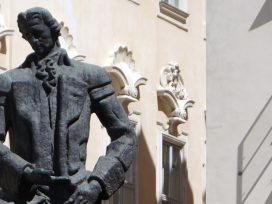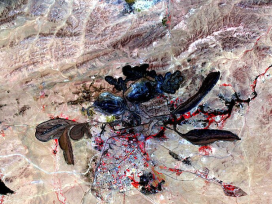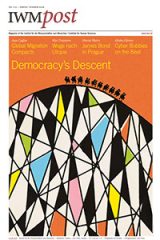

In collaboration with
Institute for Human Sciences
The Institute for Human Sciences / Institut für die Wissenschaften vom Menschen (IWM) is an independent institute for advanced study in the humanities and social sciences. Since its foundation in 1982, it has hosted more than 1500 scholars, journalists and translators from all over the world. Many of the Institute’s Permanent and Visiting Fellows are regular contributors to Eurozine or its focal points The World in Pieces and Ukraine in European Dialogue (see below).
Website: www.iwm.at
X (formerly known as Twitter): https://x.com/iwm_vienna
Youtube: https://www.youtube.com/channel/UCIwFQ_iRX8w8D0NKJo41Ihw

Articles

Internal colonialism continues to characterize relations between England and the rest of the United Kingdom. Nowhere is this more evident than in the British Government’s treatment of Northern Ireland, where lesions caused by lingering political indeterminacy have been further exposed by Brexit.

What happens to democracy when governments court the rich and highly skilled, offering citizenship as privilege, when those in need are turned away? This year’s Speech to Europe takes the concept of ‘good’ and ‘bad’ migrants to task.

Capitalism’s nervous breakdown
A conversation between Dessy Gavrilova and Albena Azmanova
Competitive labour markets, whether private or public, often set profit margins over employment rights. Job insecurity and new forms of exploitation are on the rise. As is the Far Right, cashing in on resultant worker anxieties. Is there a way out of this ‘precarity’, tormenting the overworked and underpaid?

Excitement over ‘rare’ elements
Julie Klinger in conversation with Misha Glenny
The race for green transition supplies is on. But where’s the thrill in metals, discreet and hidden yet widespread? Mining, intensive due to low concentrations, throws up waste elements like arsenic. Space cowboys and deep-sea dredgers contest environmental stability more than China’s monopoly, based on 40-years of involved processing. Health and recycling regulations are a must.
Focal points

Inspired by a lecture that Clifford Geertz delivered in 1995 at the Institute for Human Sciences in Vienna, this focal point engages with ‘deep diversity’, ‘a sense of dispersion, of particularity, of complexity and of uncenteredness’ rather than unified world order. It follows the launch of a research programme of the same name at the institute in January 2023.

Post-revolutionary Ukrainian society displays a unique mix of hope, enthusiasm, social creativity, collective trauma of war, radicalism and disillusionment. With the Maidan becoming history, the focal point ‘Ukraine in European Dialogue’ explores the new challenges facing the young democracy, its place in Europe, and the lessons it might offer for the future of the European project.
Projects and publications

